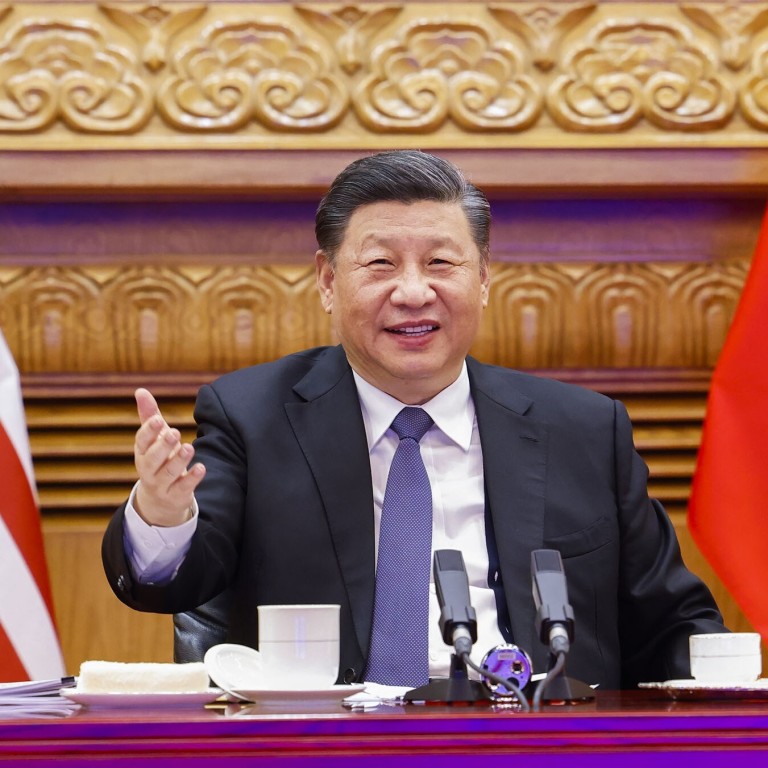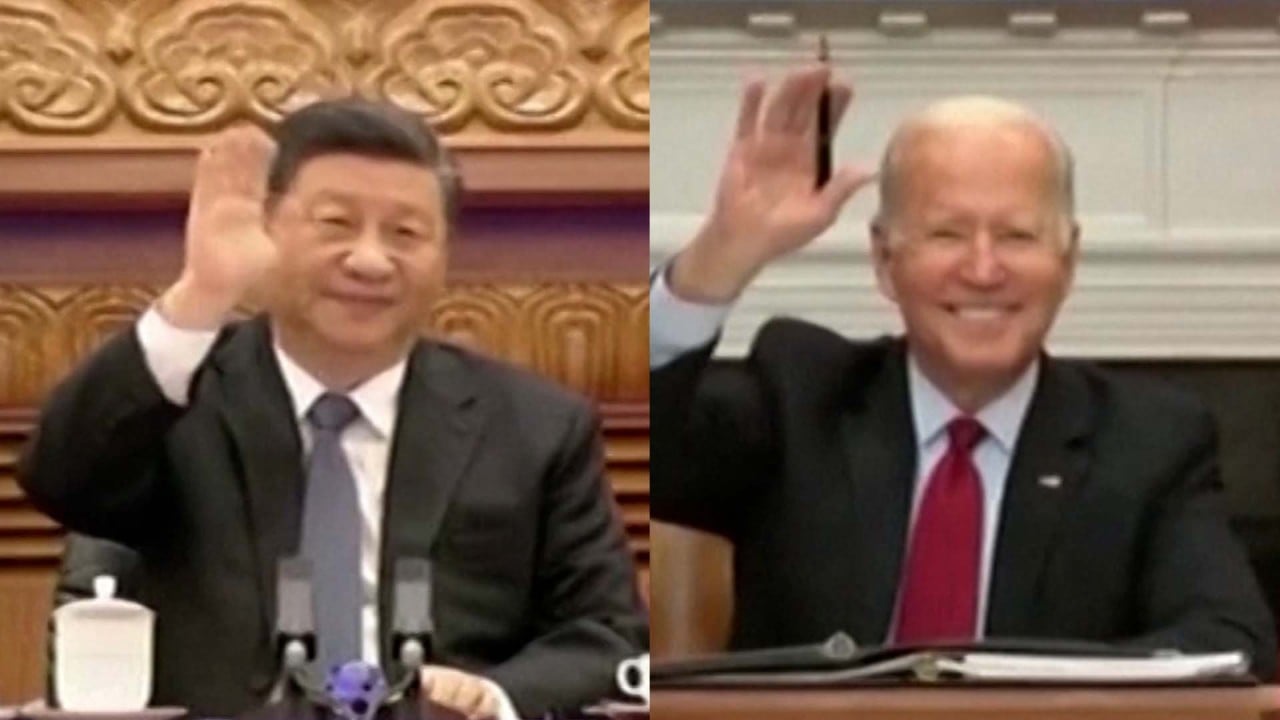
China and the US ‘must find the right way to get along’, Xi Jinping tells Joe Biden
- Leaders meet in first virtual summit, with ‘extended conversation’ on most contentious issue, Taiwan, according to US official
- Talks could prevent tensions from escalating but observers do not see either side changing tack or making key concessions
While Xi and Biden talked about the need for cooperation and agreed to avoid conflict and keep lines of communication open, both sides tried to downplay expectations for any breakthroughs after the meeting on Tuesday, which ran for more than 3½ hours.
It was a positive tone for their first virtual summit since Biden took office, but a lack of agreements showed neither side was ready to change tack or make key concessions, according to observers.
On the most contentious issue of Taiwan, which Beijing claims as its own, Xi blamed “some people in the US” for stoking tensions and trying to “use Taiwan to control China”. Beijing was incensed by Biden’s off-the-cuff comments last month pledging to defend the self-ruled island from a Chinese attack.
“We are patient and are willing to strive for the prospect of peaceful reunification with the utmost sincerity and best efforts. But China will be compelled to take resolute measures, should the separatist forces for Taiwan independence provoke us and force our hands, or even cross the red line,” he said.
In response, Biden said the US was committed to the one-China policy, but called out Beijing’s growing military pressure on Taiwan. He said Washington strongly opposed “unilateral efforts to change the status quo or undermine peace and stability across the Taiwan Strait”, according to the White House.

02:25
Xi Jinping and Joe Biden call for mutual respect and peaceful China-US coexistence
The Chinese statement quoted Biden as saying that the US did not support Taiwan independence and was not seeking to change China’s political system.
A senior US official told reporters after the meeting that Xi and Biden had “an extended conversation” on Taiwan and Biden was “quite direct about his concerns about some of Beijing’s behaviours that he believes is at odds with peace and stability across the strait”.
“In the next 50 years, the most important thing in international relations is that China and the United States must find the right way to get along … anything done by a politician, whether merits or demerits, will be recorded by history,” he said. “It is hoped that Mr President will give full play to his political leadership and push US policy towards China to return to a rational and pragmatic track.”

Zhu Feng, an international affairs expert at Nanjing University, said Xi’s remarks were aimed at Biden personally, noting they have known each other for a long time.
“They did talk about economic issues … specifically the president did underscore the importance of China fulfilling its phase one [trade deal] commitments and his desire to see real progress on the conversations that [US Trade Representative Katherine Tai] is having with her counterpart, Vice-Premier Liu He,” the senior US official said.
The two leaders struck a conciliatory tone in their opening remarks. Xi said China and the US should seek peaceful coexistence and mutually beneficial cooperation, and that they should handle their own affairs well and share global responsibility.
Biden said it was both his and Xi’s responsibility to ensure that ties did not veer into open conflict.
The Chinese leader said he was pleased to see his “old friend” Biden, though White House press secretary Jen Psaki had said before the meeting that Biden did not view Xi in such terms.

02:12
Xi-Biden summit previewed by White House press secretary Psaki
Shi Yinhong, a US affairs expert at Renmin University in Beijing, said while the meeting would help prevent tensions from escalating, it may not lead to a significant thaw in ties.
He noted that Biden had in recent weeks emphasised “straightforward competition” while calling for “guardrails” to prevent military conflict.
According to Huang Jing, dean of the Institute of International and Regional Studies at Beijing Language and Culture University, the two leaders were “straightforward but effectively talked past each other on critical issues like Taiwan”.
George Magnus, a research associate at the University of Oxford’s China Centre, noted that suspicion remains high on both sides and they are fierce competitors on trade and technology and adversaries in national security matters and fundamental values.
“I don’t see America’s approach changing much – it sees China as a threat and rival in many spheres. Nor do I see China’s often stated strategic goal, according to Xi Jinping, to emerge as a winner in the struggle against Western capitalism as negotiable,” he said. “This is the enduring reality – call it Cold War 2.0 or not – and we must hope that despite this that they can ‘manage’ their differences as well as bridge them here and there.”
The two leaders also seemed to be addressing different audiences, according to Gal Luft, co-director of the Washington-based Institute for the Analysis of Global Security.
“Biden was talking to midterm elections voters, trying to navigate among diverse constituencies and interests: business, environmentalists, China hawks, human rights groups,” he said. “Xi, coming out of the 6th plenum stronger than ever … was talking to history, trying to plead with Biden to transcend above internal politics and electoral considerations in his decision making.”
Luft said the summit would be unlikely to bring any substantial change in the relations and the mantra about the need to establish “guardrails” was only as good as the two sides’ willingness to keep their ships and aircraft far away from each other. “Neither side would agree to that. Because military conflict is almost always a product of accidental friction and miscalculation the danger of conflict has not diminished,” he said. “Still, as Churchill said, jaw-jaw is always better than war-war.”
Additional reporting by Amber Wang


